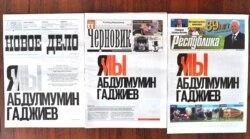Leading independent Russian media have issued a video appeal calling for the release of a journalist jailed on terrorism charges in Russia’s North Caucasus, arguing that the case is an attempt by authorities to silence a rare independent voice in the troubled region.
Abdulmumin Gadzhiev, religious affairs editor of the independent weekly Chernovik, was arrested in June 2019 in Russia’s southern province of Dagestan and accused of financing and participating in a terrorist organization.
The charges stem from a single interview Gadzhiev conducted with a preacher who ran a charity organization and was later accused of ties to terrorism under what government critics say are vaguely worded anti-extremism laws.
Investigators subsequently detained and charged Gadzhiev, arguing his interview regarding the charity encouraged public funding of the organization’s alleged terrorism efforts. A key government witness supporting Gadzhiev’s guilt appeared in court with heavy bruises and said he was tortured into providing evidence.
The case comes as Russia continues to wage a yearslong anti-terror campaign against what it says are radicals in its Muslim-dominated North Caucuses region. In recent years, state security forces have particularly pursued men it says were recruited by Islamic State militants to fight in Syria and Iraq and have since returned home to Russia.
Yet Gadzhiev’s supporters insist his writings in Chernovik consistently advocated against extremism in the region and call accusations that the journalist was somehow supportive of terrorist groups “absurd.”
"If the court read his articles, they’d see there’s nothing extreme there,” said his wife, Dana Sakieva, in an interview with VOA. “My husband himself tells them to look and see."
"They’re charging Gadzhiev with the very thing he always stood against,” added Idris Yusupov, a journalist with Novoe Delo, the region’s sole other independent publication.
As Gadzhiev’s case winds its way through the courts, his newspaper has come under intense pressure from authorities.
Security officials have repeatedly carried out search raids of Chernovik’s offices, seizing computers and other equipment, say the newspaper’s employees.
“It’s an attempt to close the newspaper, and Gadzhiev is the instrument to do so,” assistant managing editor Magomed Magamedov told VOA.
It wouldn’t be the newspaper’s first brush with danger, notes the New York-based Committee to Protect Journalists. Chernovik’s founder, Khadzhimurad Mamalov, was murdered in 2011 in a case that remains unsolved.
“We publish inconvenient information — about human rights, about the courts — and sometimes the authorities don’t like that,” Magamedov said.
On Monday, Dagestan’s high court denied a request to move Gadzhiev’s detention to house arrest pending an ongoing investigation by Russia’s Federal Security Services or FSB.
If convicted on the terrorism charges, Gadzhiev faces life in prison.
In advance of Monday’s court hearing, leading journalists from Russian media outlets recorded a joint video appeal in support of Gadzhiev.
“A journalist should not sit in prison or be prosecuted for their professional activities or words,” said several participants calling for Gadzhiev’s release.
The show of solidarity was reminiscent of a 2019 campaign to free Ivan Golunov, an leading Russian investigative journalist who was arrested on trumped-up charges of drug possession and narcotics trafficking.
In Golunov’s case, media pressure pointing out obvious inconsistencies in police accounts suggested the drugs had been planted, which led to street protests. The charges were eventually dropped.
Russia’s Investigative Committee later launched criminal proceedings against officers who carried out the arrest, accusing them of planting evidence on the journalist.
Golunov was first to appear in the video calling for Gadzhiev’s release.
On Tuesday, there were were signs that message had been received.
In comments to reporters, Kremlin spokesman Dmitry Peskov expressed certainty that Russia’s prosecutor general would look into the validity of the charges against Gadzhiev — noting that, beyond the media campaign, a Duma deputy had also raised concerns about Gadzhiev's arrest.
“We don’t know what these assertions that some evidence was given under torture are based, we don’t know how much they reflect reality,” said Peskov, adding that the Kremlin was still unfamiliar with details of the case.
Meanwhile, press freedom advocates note other terrorism cases targeting journalists elsewhere in Russia.
Svetlana Prokopyeva, a freelance journalist based in the northwestern Russian city of Pksov, faces a possible seven years in prison for allegedly “justifying terrorism” in a 2018 editorial.
In a column read over a local radio station, Prokopyeva tried to address what led a young Russian student to carry out a suicide bombing outside FSB headquarters in the city of Arkhangelisk in which three security officers were injured.
Human Rights Watch has pointed to these cases as examples of authorities wielding stringent anti-terrorism laws at the media.
“The prosecutions of Prokopyeva and Gadzhiev are clear attempts by the Russian government to silence its critics in the media,” wrote Tanya Lokshina, HRW’s associate director for Europe and Central Asia, in an article published last year. “While the cases may be different, they send a chilling and unambiguous message to all journalists in Russia.”





